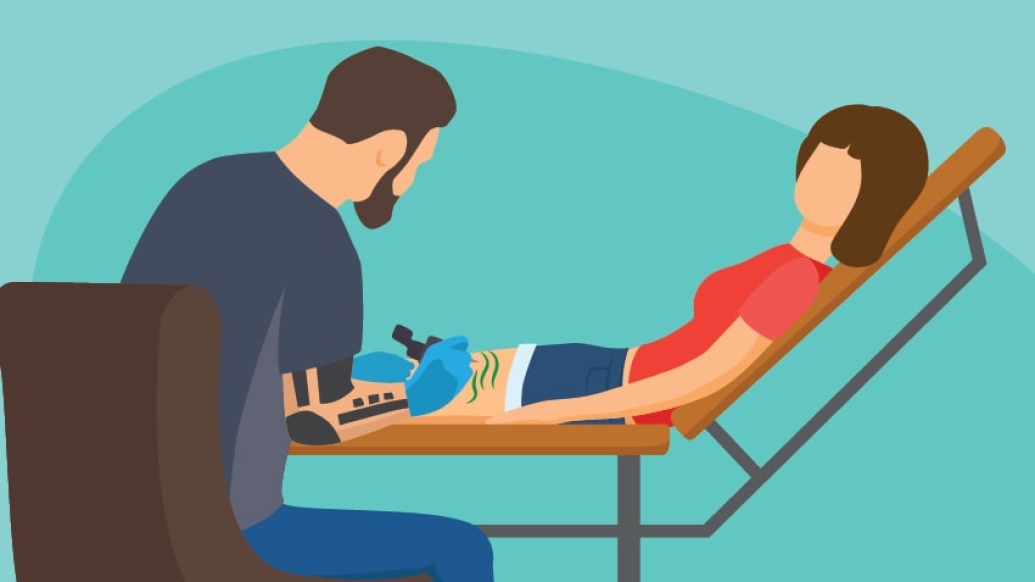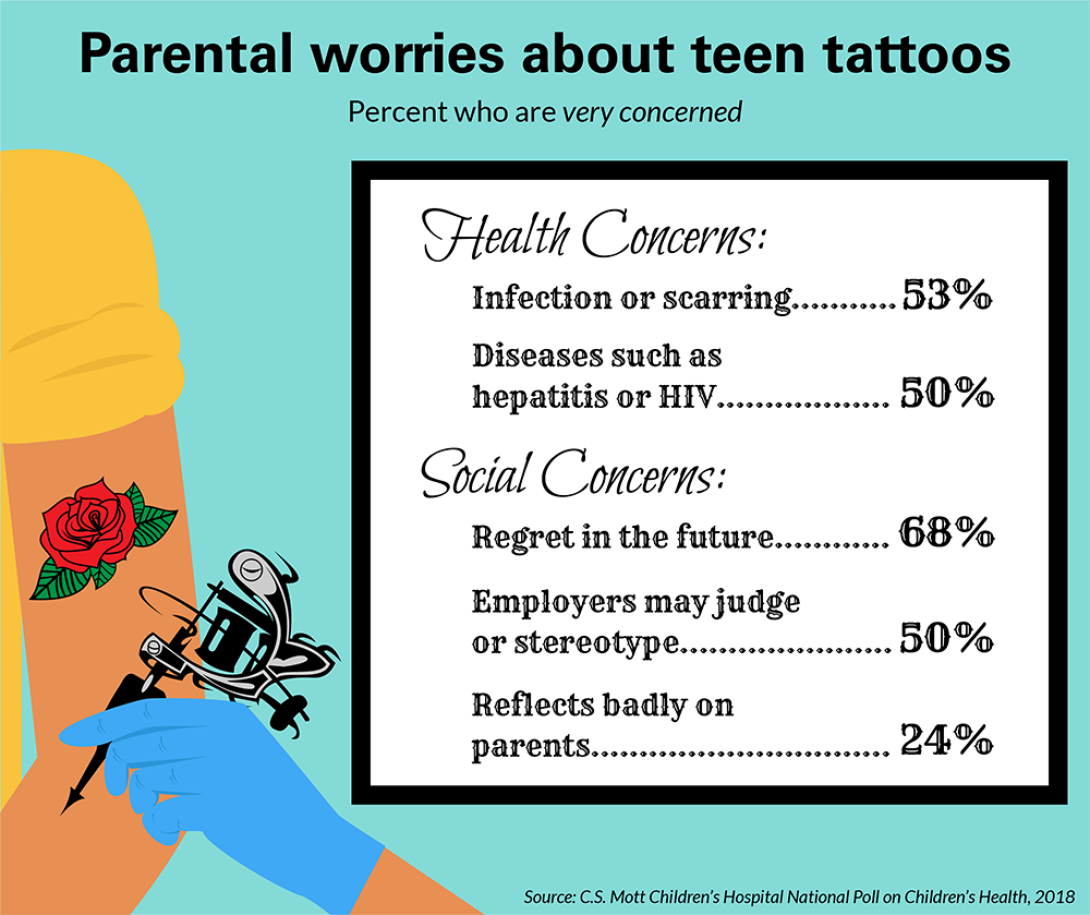An adolescent medicine physician offers tips on handling the big question — and how to address issues of safety and self-restraint.
7:00 AM
Author |

Nearly 80 percent of parents have a clear answer about how they would respond if their teen asked for a tattoo: absolutely not.
But it's a topic of conversation many parents face, according to the C.S. Mott Children's Hospital National Poll on Children's Health at the University of Michigan. A quarter of surveyed parents with high school-aged kids say their teens have brought up a tattoo.
LISTEN UP: Add the new Michigan Medicine News Break to your Alexa-enabled device, or subscribe to our daily audio updates on iTunes, Google Play and Stitcher.
Topping the list of parental concerns: impact on health, social acceptance and the child's professional career. (The No. 1 concern? Future regret.)
Pediatricians once considered tattoos a marker of risky behavior such as drug and alcohol use or school truancy, says Mott adolescent medicine physician Terrill Bravender, M.D., MPH.
That's no longer the case. Tattoos have become more mainstream, with more than a third of people ages 18 to 29 having at least one, according to a 2017 Pew Research Center study.
So how should you respond if your child asks to get a tattoo?
Bravender, in his own words, offers advice on how to navigate those discussions:
Talking about tattoos with your teen
Learn their reasons for wanting one: Ask your teens plenty of questions. How long have they been thinking about a tattoo, and what does it mean to them? Is the image they're considering something particularly meaningful — or just trendy or seemingly impulsive? Why does it need to happen now?
It's important that the reasons are not short-lived (e.g., it's a hot trend today), because that makes it less likely that they'll still like it many years later.
Discuss potential health risks: Roughly half of parents in the Mott poll said they were very concerned about negative health effects such as infection, scarring and transmission of diseases — such as hepatitis or HIV — via unsanitary needles.
MORE FROM MICHIGAN: Subscribe to our weekly newsletter
While these negative health effects are not common, they are real risks, especially if tattoos are done in an amateur fashion and not in an established, reputable shop. Licensing for tattoo artists runs the gamut and varies by state.
Talk about the impact on professional prospects: Half of surveyed parents were very concerned that employers might judge or stereotype a teen with a tattoo; 24 percent were very concerned that a tattoo would reflect badly on the parents.
Employers' acceptance of tattoos has gone up over the past couple of decades. Fewer businesses now ban employee tattoos, but some still prohibit visible tattoos in the workplace.
Still, there's always a chance that a tattoo could turn off a potential employer. The understandable teenage response is often "that's not fair." That may be the case, but we know this happens and it's something they should be prepared for.
Propose alternative forms of expression: Two-thirds of parents (63 percent) in the Mott poll agreed that tattoos are a form of self-expression similar to dyeing hair or clothing choice. There are few, if any, reasons for a parent to try to control a child's hairstyle or wardrobe. But those decisions aren't permanent.
Unsurprisingly, the most common concern (among 68 percent of parents polled) was that as their children age and mature, they may regret getting a permanent tattoo. This is a valid issue. Tattoos are very difficult to get rid of.
Teens should not go into this thinking it's something they can later reverse — because doing so is painful, expensive and time-consuming. Ask them if they're sure this is a tattoo they will want on their body for the rest of their life.
Don't bow to pressure: A common theme when we talk to parents about adolescent choices is not to encourage anything you don't want to see your teen doing. So if you don't want your child to get a tattoo, don't pay for it and don't sign paperwork giving minors permission to get one, even if they beg or threaten to find a way to get one without your knowledge.
SEE ALSO: Make Sure Your Teen Has Had These 4 Lifesaving Vaccines
Thirty-two percent of parents in the Mott poll had a tattoo themselves. Even if you're one of those parents, you're under no obligation to agree. Bottom line: It's not going to ruin a teenager's life to wait until he or she is 18 to get a tattoo.
Have respectful dialogue: Even when you disagree or say no, a loving approach is important. Openly discuss the pros and cons of tattoos and calmly ask your teens questions they may not have considered: How do they feel this would enhance their life? What potential consequences might it lead to? Would other, less permanent forms of expression suffice for now?
Keeping the communication lines open and loving will increase the likelihood that your teen will turn to you when something bigger comes along.
If you do agree to the tattoo: While an overwhelming majority of parents — 78 percent — said they would "absolutely not consider" letting their teens get a tattoo, 1 in 10 thought a tattoo would be OK as a reward, to mark a special occasion or if the tattoo could be hidden.
If you're among parents who would say yes to a tattoo, thoroughly research the tattoo parlor to ensure that it has been in business for a long time and that it employs a skilled artist in an established location.
Interview artists about antiseptic processes and the equipment they use. Keep in mind that health risks go up dramatically if tattoos are done in a home. Ideally, you would also get a referral from someone satisfied with the work that artist has done.


Explore a variety of healthcare news & stories by visiting the Health Lab home page for more articles.

Department of Communication at Michigan Medicine
Want top health & research news weekly? Sign up for Health Lab’s newsletters today!





